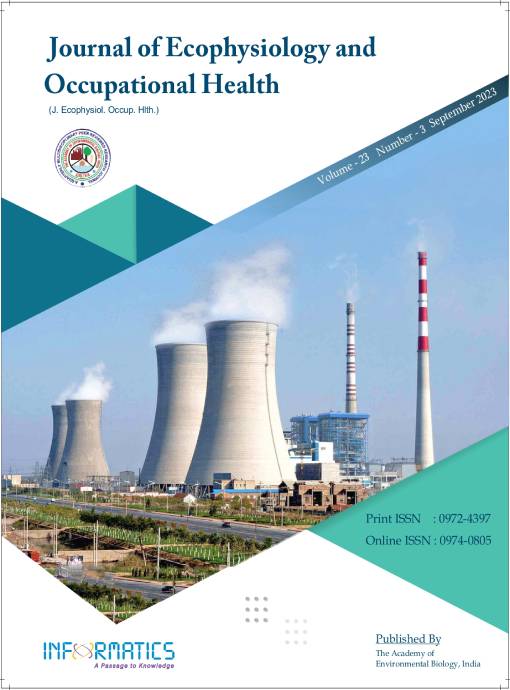Work-Life Conflict during Covid-19 and Psychological Resilience Role of Self-Affirmation Interventions - A Study in Bangalore, India
DOI:
https://doi.org/10.18311/jeoh/2023/34181Keywords:
Covid-19, Psychological Resilience, Stress, Self-Affirmation Interventions, Work- Family ConflictAbstract
The present research is an attempt to find out the impact of work-family conflict on employee resilience and the role of Self-affirmative interventions in building the resilience and mitigating the impact. A total of 55 interviews were conducted. This paper proposes that work-life conflict during Covid-19 had a negative impact on psychological resilience. Moreover, various self-affirmation strategies adopted by the respondents during Covid-19 helped them to combat the work-family conflict and stress created by it. A research need has been identified by the previous research to find out the role of self-affirmation interventions in aligning the values and needs with changed or unexpected environments to tackle the work-family conflict. Moreover, the relationship between the psychological resilience and self-affirmation interventions has not been explored previously, particularly in the Indian Context.
Downloads
Metrics
Downloads
Published
How to Cite
Issue
Section
License
Copyright (c) 2023 Shagufta Showkat

This work is licensed under a Creative Commons Attribution 4.0 International License.
Accepted 2023-08-30
Published 2023-09-19
References
Bavel JJ, Baicker K, Boggio PS, Capraro V, Cichocka A, Cikara M, Crockett MJ, Crum AJ, Douglas KM, Druckman JN, Drury J. Using social and behavioral science to support COVID-19 pandemic response. Nature Human Behaviour. 2020; 4(5):460- 71. https://doi.org/10.1038/s41562-020-0884-z. DOI: https://doi.org/10.1038/s41562-020-0884-z
Chrisangika Perera JK, Kailasapathy P. Individual, spousal factors and work–family conflict: a study from Sri Lanka. South Asian Journal of Human Resources Management. 2020; 7(1):91-120. https://doi.org/10.1177/2322093720923276. DOI: https://doi.org/10.1177/2322093720923276
Greenhaus JH, Beutell NJ. Sources of conflict between work and family roles. Academy of Management Review. 1985; 10(1):76- 88. https://doi.org/10.2307/258214. DOI: https://doi.org/10.5465/amr.1985.4277352
Ramalakshmi V, Kandappan GS. A study about relationship between job perception and employee’s behavioral intentions. The International Journal of Analytical and Experimental Modal Analysis. 2019; XI(IX):401-9.
Antonovsky A. Unraveling the mystery of health: How people manage stress and stay well. San Francisco; 1987. p. 175.
Tugade MM, Fredrickson BL. Regulation of positive emotions; emotion regulation strategies that promote resilience. Journal of Happiness Studies. 2007; 8:311-33. https://doi.org/10.1007/ s10902-006-9015-4. DOI: https://doi.org/10.1007/s10902-006-9015-4
Chen P, Xu Y, Sparrow P, Cooper C. Compulsory citizenship behaviour and work-family conflict: a moderated mediation model. Current Psychology. 2023; 42(8):6641-52. https://doi. org/10.1007/s12144-021-01973-4. DOI: https://doi.org/10.1007/s12144-021-01973-4
Cohen GL, Sherman DK. The psychology of change: Selfaffirmation and social psychological intervention. Annual Review of Psychology. 2014; 65:333-71. https://doi.org/10.1146/ annurev-psych-010213-115137. DOI: https://doi.org/10.1146/annurev-psych-010213-115137
Carnevale JB, Hatak I. Employee adjustment and well-being in the era of COVID-19: Implications for human resource management. Journal of Business Research. 2020; 116:183-7. https://doi.org/10.1016/j.jbusres.2020.05.037. DOI: https://doi.org/10.1016/j.jbusres.2020.05.037
Friedman SD, Westring A. Empowering individuals to integrate work and life: Insights for management development. Journal of Management Development. 2015; 34(3):299-315. https://doi. org/10.1108/JMD-11-2012-0144. DOI: https://doi.org/10.1108/JMD-11-2012-0144
Eby LT, Casper WJ, Lockwood A, Bordeaux C, Brinley A. A twenty-year retrospective on work and family research in IO/OB: A review of the literature. Journal of Vocational Behavior. 2005; 66:124-97. https://doi.org/10.1016/j.jvb.2003.11.003. DOI: https://doi.org/10.1016/j.jvb.2003.11.003
Giurge L, Bohns VK. 3 tips to avoid WFH burnout. Harvard Business Review; 2020.
Amstad FT, Meier LL, Fasel U, Elfering A, Semmer NK. A metaanalysis of work–family conflict and various outcomes with a special emphasis on cross-domain versus matching- domain relations. Journal of Occupational Health Psychology. 2011; 16(2):151. https://doi.org/10.1037/a0022170. DOI: https://doi.org/10.1037/a0022170
Bakker AB, Demerouti E. The job demands‐resources model: State of the art. Journal of Managerial Psychology. 2007; 22(3):309-28. https://doi.org/10.1108/02683940710733115. DOI: https://doi.org/10.1108/02683940710733115
Hagqvist E, Gådin KG, Nordenmark M. Work–family conflict and well-being across Europe: The role of gender context. Social Indicators Research. 2017; 132:785-97. https://doi.org/10.1007/ s11205-016-1301-x. DOI: https://doi.org/10.1007/s11205-016-1301-x
Kuntz JR, Näswall K, Malinen S. Resilient employees in resilient organizations: Flourishing beyond adversity. Industrial and Organizational Psychology. 2016; 9(2):456- 62. https://doi. org/10.1017/iop.2016.39. DOI: https://doi.org/10.1017/iop.2016.39
Meadows GN, Enticott JC, Inder B, Russell GM, Gurr R. Better access to mental health care and the failure of the Medicare principle of universality. Medical Journal of Australia. 2015; 202(4):190-4. https://doi.org/10.5694/mja14.00330. DOI: https://doi.org/10.5694/mja14.00330
Herbane B, Elliott D, Swartz EM. Business continuity management: time for a strategic role? Long-Range Planning. 2004; 37(5):435-57. https://doi.org/10.1016/j.lrp.2004.07.011. DOI: https://doi.org/10.1016/j.lrp.2004.07.011
Luthans F. The Need for and meaning of positive organizational behavior. Journal of Organizational Behavior: The International Journal of Industrial, Occupational and Organizational Psychology and Behavior. 2002; 23(6):695-706. https://doi. org/10.1002/job.165. DOI: https://doi.org/10.1002/job.165
Hu T, Zhang D, Wang J. A meta-analysis of the trait resilience and mental health. Personality and Individual Differences. 2015; 76:18-27. https://doi.org/10.1016/j.paid.2014.11.039. DOI: https://doi.org/10.1016/j.paid.2014.11.039
Zou G, Shen X, Tian X, Liu C, Li G, Kong L, Li P. Correlates of psychological distress, burnout, and resilience among Chinese female nurses. Industrial Health. 2016; 54(5):389- 95. https://doi. org/10.2486/indhealth.2015-0103. DOI: https://doi.org/10.2486/indhealth.2015-0103
Cohen GL, Garcia J, Purdie-Vaughns V, Apfel N, Brzustoski P. Recursive processes in self-affirmation: Intervening to close the minority achievement gap. Science. 2009; 324(5925):400-3. https://doi.org/10.1126/science.1170769. DOI: https://doi.org/10.1126/science.1170769
Steele CM. The psychology of self-affirmation: Sustaining the integrity of the self. In Advances in experimental social psychology. Academic Press. 1988; 21:261-302. https://doi. org/10.1126/science.1170769. DOI: https://doi.org/10.1016/S0065-2601(08)60229-4
Aronson E. The theory of cognitive dissonance: A current perspective. In Advances in Experimental Social Psychology. Academic Press. 1969; 4:1-34. https://doi.org/10.1016/S0065- 2601(08)60075-1. DOI: https://doi.org/10.1016/S0065-2601(08)60075-1
Zwack J, Schweitzer J. If every fifth physician is affected by burnout, what about the other four? Resilience strategies of experienced physicians. Academic Medicine. 2013; 88(3):382-9. https://doi.org/10.1097/ACM.0b013e318281696b. DOI: https://doi.org/10.1097/ACM.0b013e318281696b
Sherman DK. Self‐affirmation: Understanding the effects. Social and Personality Psychology Compass. 2013; 7(11):834-45. https://doi.org/10.1111/spc3.12072. DOI: https://doi.org/10.1111/spc3.12072
Smith JA. Participants and researchers searching for meaning: Conceptual developments for interpretative phenomenological analysis. Qualitative Research in Psychology. 2019; 16(2):166-81. https://doi.org/10.1080/14780887.2018.1540648. DOI: https://doi.org/10.1080/14780887.2018.1540648
Allen TD, Armstrong J. Further examination of the link between work-family conflict and physical health: The role of health-related behaviors. American Behavioral Scientist. 2006; 49(9):1204-21. https://doi.org/10.1177/0002764206286386. DOI: https://doi.org/10.1177/0002764206286386
Grzywacz JG, Bass BL. Work, family, and mental health: Testing different models of work‐family fit. Journal of Marriage and Family. 2003; 65(1):248-61. https://doi.org/10.1111/j.1741- 3737.2003.00248.x. DOI: https://doi.org/10.1111/j.1741-3737.2003.00248.x
Greenhaus JH, Allen TD, Spector PE. Health consequences of work–family conflict: The dark side of the work–family interface. In Employee Health, Coping and Methodologies. Emerald Group Publishing Limited. 2006; 5:61-98. https://doi.org/10.1016/ S1479-3555(05)05002-X. DOI: https://doi.org/10.1016/S1479-3555(05)05002-X
Janzen BL, Muhajarine N, Kelly IW. Work-family conflict, and psychological distress in men and women among Canadian police officers. Psychological reports. 2007; 100(2):556- 62. https://doi.org/10.2466/pr0.100.2.556-562. DOI: https://doi.org/10.2466/pr0.100.2.556-562
Grandey AA, Dickter DN, Sin HP. The customer is not always right: Customer aggression and emotion regulation of service employees. Journal of Organizational Behavior: The International Journal of Industrial, Occupational and Organizational Psychology and Behavior. 2004; 25(3):397-418. https://doi. org/10.1002/job.252. DOI: https://doi.org/10.1002/job.252
Harrist AW, Henry CS, Liu C, Morris AS. Family resilience: The power of rituals and routines in family adaptive systems. 2019. https://doi.org/10.1037/0000099-013. DOI: https://doi.org/10.1037/0000099-013
Nalbandian A, Sehgal K, Gupta A, Madhavan MV, McGroder C, Stevens JS, Cook JR, Nordvig AS, Shalev D, Sehrawat TS, Ahluwalia N. Post-acute COVID-19 syndrome. Nature Medicine. 2021; 27(4):601-15. https://doi.org/10.1038/s41591-021-01283-z. DOI: https://doi.org/10.1038/s41591-021-01283-z
Frank E, Zhao Z, Fang Y, Rotenstein LS, Sen S, Guille C. Experiences of work-family conflict and mental health symptoms by gender among physician parents during the COVID-19 pandemic. JAMA Network Open. 2021; 4(11):e2134315-. https:// doi.org/10.1001/jamanetworkopen.2021.34315. DOI: https://doi.org/10.1001/jamanetworkopen.2021.34315
Ghislieri C, Molino M, Dolce V, Sanseverino D, Presutti M. Workfamily conflict during the Covid-19 pandemic: teleworking of administrative and technical staff in healthcare. An Italian Study. La Medicina del lavoro. 2021; 112(3):229.
Lee J, Chin M, Sung M. How has COVID-19 changed family life and well-being in Korea? Journal of Comparative Family Studies. 2020; 51(3-4):301-13. https://doi.org/10.3138/jcfs.51.3-4.006. DOI: https://doi.org/10.3138/jcfs.51.3-4.006
Bradbury‐Jones C, Isham L. The pandemic paradox: The consequences of COVID‐19 on domestic violence. Journal of Clinical Nursing. 2020; 29(13-14):2047. https://doi.org/10.1111/ jocn.15296. DOI: https://doi.org/10.1111/jocn.15296
Orejarena BO, Murillo CR, Vicente JS. Burnout syndrome in the covid-19 pandemic and the virtualization of education. Turkish Journal of Computer and Mathematics Education (TURCOMAT). 2021; 12(3):4750-61. https://doi.org/10.17762/ turcomat.v12i3.1937. DOI: https://doi.org/10.17762/turcomat.v12i3.1937
Rudoph J. CDT Censorship Digest, June 2020: A Power Struggle over Memory. China Digital Times. 2020.
Evans B. The Zoom revolution: 10 eye-popping stats from tech’s new superstar. Cloud Wars. 2020.
Eddleston KA, Mulki J. Toward understanding remote workers’ management of work– family boundaries: The complexity of workplace embeddedness. Group and Organization Management. 2017; 42(3):346-87. https://doi.org/10.1177/1059601115619548. DOI: https://doi.org/10.1177/1059601115619548
Moreno-Jiménez B, Mayo M, Sanz-Vergel AI, Geurts S, Rodríguez-Muñoz A, Garrosa E. Effects of work–family conflict on employees’ well-being: The moderating role of recovery strategies. Journal of Occupational Health Psychology. 2009; 14(4):427. https://doi.org/10.1037/a0016739. DOI: https://doi.org/10.1037/a0016739
Rantanen J, Pulkkinen L, Kinnunen U. The Big Five personality dimensions, work-family conflict, and psychological distress: A longitudinal view. Journal of Individual Differences. 2005; 26(3):155-66. https://doi.org/10.1027/1614-0001.26.3.155. DOI: https://doi.org/10.1027/1614-0001.26.3.155
Robinson AM, Jubenville TM, Renny K, Cairns SL. Academic and mental health needs of students on a Canadian campus. Canadian Journal of Counselling and Psychotherapy. 2016; 50(2). 46. Walsh R. Lifestyle and mental health. American Psychologist. 2011; 66(7):579. https://doi.org/10.1037/a0021769. DOI: https://doi.org/10.1037/a0021769
Falk EB, O’Donnell MB, Cascio CN, Tinney F, Kang Y, Lieberman MD, Taylor SE, An L, Resnicow K, Strecher VJ. Self-affirmation alters the brain’s response to health messages and subsequent behavior change. Proceedings of the National Academy of Sciences. 2015; 112(7):1977-82. https://doi.org/10.1073/ pnas.1500247112. DOI: https://doi.org/10.1073/pnas.1500247112
Gant W, Burns BJ. Positive Affirmations.
Post L, Ganzevoort RR, Verdonck-de Leeuw IM. Transcending the suffering in cancer: Impact of a spiritual life review intervention on spiritual re-evaluation, spiritual growth and psycho-spiritual wellbeing. Religions. 2020; 11(3):142. https://doi.org/10.3390/ rel11030142. DOI: https://doi.org/10.3390/rel11030142
Grossman P, Niemann L, Schmidt S, Walach H. Mindfulnessbased stress reduction and health benefits: A meta-analysis. Journal of Psychosomatic Research. 2004; 57(1):35-43. https:// doi.org/10.1016/S0022-3999(03)00573-7. DOI: https://doi.org/10.1016/S0022-3999(03)00573-7
De Cremer D, Sedikides C. Self-uncertainty and responsiveness to procedural justice. Journal of Experimental Social Psychology. 2005; 41(2):157-73. https://doi.org/10.1016/j.jesp.2004.06.010. DOI: https://doi.org/10.1016/j.jesp.2004.06.010
Sorajjakool S, Aja V, Chilson B, Ramírez-Johnson J, Earll A. Disconnection, depression, and spirituality: A study of the role of spirituality and meaning in the lives of individuals with severe depression. Pastoral Psychology. 2008; 56:521-32. https://doi. org/10.1007/s11089-008-0125-2. DOI: https://doi.org/10.1007/s11089-008-0125-2
Golaya S. Touch-hunger: An unexplored consequence of the COVID-19 pandemic. Indian Journal of Psychological Medicine. 2021; 43(4):362-3. https://doi.org/10.1177/02537176211014469. DOI: https://doi.org/10.1177/02537176211014469
Huang SL, Li RH, Fang SY, Tang FC. Well-being: its relationship with work-to-family conflict and burnout among males and females. International Journal of Environmental Research and Public Health. 2019; 16(13):2291. https://doi.org/10.3390/ ijerph16132291. DOI: https://doi.org/10.3390/ijerph16132291
Dishon-Berkovits M. Burnout: Contributing and protecting factors within the work–family interface. Journal of Career Development. 2014; 41(6):467-86. https://doi. org/10.1177/0894845313512181. DOI: https://doi.org/10.1177/0894845313512181
Del Boca D, Oggero N, Profeta P, Rossi M. Women’s and men’s work, housework and childcare, before and during COVID- 19. Review of Economics of the Household. 2020; 18:1001-17. https://doi.org/10.1007/s11150-020-09502-1. DOI: https://doi.org/10.1007/s11150-020-09502-1
Vella SL, Pai NB. A theoretical review of psychological resilience: Defining resilience and resilience research over the decades. Archives of Medicine and Health Sciences. 2019; 7(2):233-9. https://doi.org/10.4103/amhs.amhs_119_19. DOI: https://doi.org/10.4103/amhs.amhs_119_19
Britt TW, Shen W, Sinclair RR, Grossman MR, Klieger DM. How much do we really know about employee resilience? Industrial and Organizational Psychology. 2016; 9(2):378-404. https://doi. org/10.1017/iop.2015.107. DOI: https://doi.org/10.1017/iop.2015.107
Swanpitak R. Representations of Female Sexuality and Subjectivity in the Fiction of Wang Anyi, Tie Ning, and Chi Li (Doctoral dissertation, University of Sydney); 2020.
Howell AJ. Self-affirmation theory and the science of well-being. Journal of Happiness Studies. 2017; 18:293-311. https://doi. org/10.1007/s10902-016-9713-5. DOI: https://doi.org/10.1007/s10902-016-9713-5
Crocker J, Niiya Y, Mischkowski D. Why does writing about important values reduce defensiveness? Self-affirmation and the role of positive other-directed feelings. Psychological Science. 2008; 19(7):740-7. https://doi.org/10.1111/j.1467- 9280.2008.02150.x. DOI: https://doi.org/10.1111/j.1467-9280.2008.02150.x
McQueen A, Klein WM. Experimental manipulations of self-affirmation: A systematic review. Self and Identity. 2006; 5(4):289-354. https://doi.org/10.1080/15298860600805325. DOI: https://doi.org/10.1080/15298860600805325
Yang CL, Lee CM, Tsao LI. Life experiences of caring for pets among Taiwanese community-dwelling older adults: Pets as an integral part of the family and beyond. Journal of Gerontological Nursing. 2017; 43(1):44-9. https://doi.org/10.3928/00989134- 20160928-02. DOI: https://doi.org/10.3928/00989134-20160928-02
Lin CY, Shih PY, Ku LJ. Activities of daily living function and neuropsychiatric symptoms of people with dementia and caregiver burden: The mediating role of caregiving hours. Archives of Gerontology and Geriatrics. 2019; 81:25-30. https:// doi.org/10.1016/j.archger.2018.11.009. DOI: https://doi.org/10.1016/j.archger.2018.11.009
Taku K. Relationships among perceived psychological growth, resilience and burnout in physicians. Personality and Individual Differences. 2014; 59:120-3. https://doi.org/10.1016/j. paid.2013.11.003. DOI: https://doi.org/10.1016/j.paid.2013.11.003
 Shagufta Showkat
Shagufta Showkat








